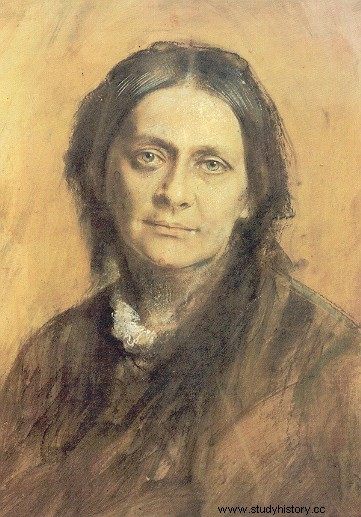Clara Wieck, who married Clara Schumann (1819 – 1896) was a German musician and composer. A young prodigy, she was largely overshadowed by the success of her husband.
Fascinated by music

Clara Wieck was born in Leipzig, Germany, on September 13, 1819, into a family of musicians. His mother, Marianne Wieck née Marianne Tromlitz, was a famous singer, while his father, Friedrich Wieck, taught piano. Clara has an older sister, who died in infancy, and three younger brothers.
When she was only five years old, her parents separated and her father took her away from her mother. Traumatized by this event, Clara remained silent until the age of eight. However, she was fascinated by music and, from an early age, Friedrich introduced her daughter to the piano.
Clara was quickly taken out of public school to devote herself to music for several hours a day. A talented teacher, her father taught other students, including Clara's future husband, Robert Schumann, who stayed with the family for a few months. When they meet, she is eight years old and he is seventeen.
Clara, the young prodigy
At nine years old, Clara, a young prodigy, gave her first concerts. She thus performed in the Gewandhaus in Leipzig, the city's large concert hall, initially performing classical and popular works selected by her father. She also began to compose her own works, publishing in 1829, at the age of ten, Quatre Polonaises . Meeting with success, the little girl, barely eleven years old, left in 1830 on a European tour with her father. The young musician continues her compositional work, notably with Caprices in the form of a Valse for piano (1831 – 1832), Varied romance for piano (1833) or Romantic waltzes for piano (1835). In all, she will compose around forty works.
A marriage trial
At the age of sixteen, Clara and Robert Schumann fell in love with each other. Robert asks for her hand when she turns eighteen, and the young prodigy accepts. Disapproving of the young man, who has no income and could distract Clara from her career, Friedrich vehemently opposes the union. Forbidding his daughter to see his fiancée again, he takes her on a tour of Europe, but the lovers manage to keep in touch by correspondence and do not give up on their project.
Finally, in 1839, they appealed to justice by filing a complaint against Friedrich for refusing to consent to marriage. In August 1840, the judgment is favorable to them and the marriage takes place in September. Robert and Clara will have eight children, and their union marks a significant setback in the musical career of the prodigy.
“The pianist’s husband”
At first, Robert asks his wife to reduce his rehearsal time to allow him to concentrate, as well as his concerts to stay with him. But the performances of the young virtuoso are the main source of income for the household, and Clara Schumann continues to perform. Still composing her own pieces, although devoting herself less to them than before her marriage, she became the first performer of her husband's works. She tours in northern Germany, Denmark, Russia. In 1844, Robert accompanied her on one of her tours but considered it degrading for him to be only the “pianist’s husband”. Already suffering from health problems and anxiety attacks, his symptoms worsen when he returns from the trip and he sinks into depression.
Clara and Robert lived and worked for some time in Dresden before settling in Düsseldorf where a job awaited them:the city offered Robert the position of director of the orchestra, and Clara that of concert performer. Soon, however, Robert's health problems - tinnitus, speech problems, hallucinations, fatigue - made him unfit to conduct an orchestra. The criticisms are becoming more and more virulent, and he must abandon his post to leave it to his assistant. In February 1854, he attempted suicide by jumping into the Rhine. Interned, he will never leave the asylum. Two years later, understanding that there is no longer any hope of getting out, he stops eating. In July 1856, he died of cachexia.
Defending the works of her husband
Widowed at 37, Clara Schumann finds herself alone with their seven surviving children, the last of whom is only two years old. Her friends, including Johannes Brahms and Joseph Joachim, support her, but she refuses any charity. Continuing the tours, she interprets the works of her husband, which she will defend until the end of her life. In her later years, she devoted herself to publishing all of her work. She herself will no longer compose. A good pedagogue, she teaches piano at the Frankfurt Conservatory. In 1891, she gave her last concert.
On May 20, 1896, Clara Schumann died of a stroke. She is buried alongside her husband.
